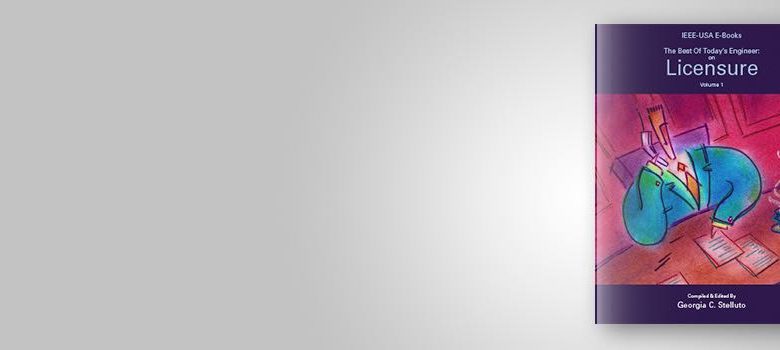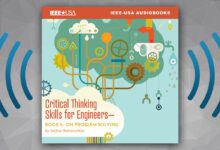
In November, IEEE-USA eBOOKS will offer The Best of Today’s Engineer: On Licensure–Volume 1, compiled by Georgia C. Stelluto.
This eBook is a compilation of articles that will help the reader understand why one should pursue licensure; the licensure process; exam development; and how to effectively study for and pass the licensure exams.
In the article, “To P.E. or not to P.E.?,” author Steven F. Barrett, Ph.D., P.E., a member of IEEE-USA’s Licensure and Registration Committee, gives an account of his personal quest as to whether to pursue professional licensure. The decision came when he realized that positions he desired in the civilian world–department head or dean of an electrical and computer engineering department at a university–required licensing as a professional engineer. Even as a consulting engineer, he found he would be required to have an engineering license.
However, Barrett made his ultimate decision when he discussed it with his mother. She told her son: “Any professionals worth their salt are registered!” Barrett’s mother had been a registered nurse for 50 years, and she was a former commissioned Navy flight nurse during the Korean War.
In his research, Barrett realized that he had to pass the Fundamentals of Engineering (FE) exam first, an eight-hour exam offered only twice a year. He joined a study group of other people who had the same desire to obtain licensure. After passing the F.E. exam, the group continued to study for, and passed, the eight-hour P.E. exam–earning the right to proudly display P.E. after their names.
Other articles in The Best of Today’s Engineer: On Licensure – Vol. 1 include:
In “Don’t be Scared of Taking the Fundamentals of Engineering Exam,” author Jignasa Ray shares the fears she had about taking the F.E. exam; how she overcame her fears; and how she then pursued P.E. licensure.
And, in the article, “It’s Never Too Late to Become a Professional Engineer: My Unconventional Path to Licensure,” Dave Cotton writes about how he’d graduated with an electrical engineering degree in 1983; took the FE exam in 2005, at the age of 43; and then took the P.E. exam in 2006. Cotton expresses how his P.E. license gave him the confidence to pursue his master’s degree in telecommunications; and how having his license opened doors that would otherwise not have been opened, had he not pursued being a licensed professional engineer.
IEEE-USA Licensure and Registration Committee members who have been active for many years have written the other article in this compilation volume–in its effort to promote licensure to U.S. IEEE members. They feel strongly that all engineers should pursue licensure–for a variety of the reasons this book explores.
From 1 November to 15 December, you can get your free eBook to download by going to https://ieeexplore.ieee.org/document/6978802. Log in with your IEEE account; add the book to your cart; and use promo code NOVFREE at checkout.
DECEMBER FREE E-BOOK
In December, IEEE-USA eBooks will offer Leading and Managing Engineering & Technology–Book 3: Building a Culture that Develops Leaders and Managers, by Gerard H. (Gus) Gaynor.
Gaynor writes about such topics as: “The Basic Organizational Culture”; “Building a Leadership Culture”; and even a “Case Study: IBM’s Silverlake Project.”
Other IEEE-USA eBooks are available at a discount to members at: https://ieeeusa.org/shop//.
CALL FOR AUTHORS
IEEE-USA eBooks seeks authors to write an eBook, or an eBook series, on career guidance and development topics. If you have an idea you think will benefit members in a particular area of expertise, please email your proposal to IEEE-USA Publishing Manager Georgia C. Stelluto at g.stelluto@ieee.org and IEEE-USA eBook Chair Gus Gaynor at g.gaynor@ieee.org.
Sharon Richardson is IEEE-USA’s Coordinator, Publishing & Communications






